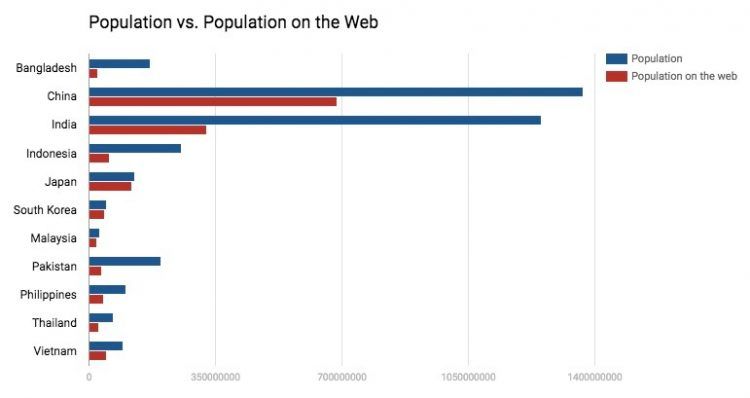
Photo credit: twinsterphoto / 123RF.
The digital economy’s on its way to becoming the great equalizer of the world – but it’s got some serious obstacles to get around first.
In Asia, a new report finds that government corruption, language barriers, and a lack of confidence and education about the digital economy hinder the progress of many of those trying to freelance or run online businesses. Depending on location, infrastructure may also pose a challenge.
A digital worker is someone who transacts business online – either by selling goods or performing services like marketing.
As for what makes a good cross-border digital worker, those surveyed describe a strong work ethic – hard work, a strong will, a desire to continuously learn, and self confidence – combined with a really good internet connection.
The Digital Economy in Asia report was produced by Payoneer, which processes payments in 150 currencies across 200 countries, after surveying its top users in 11 countries – Bangladesh, China, India, Indonesia, Japan, South Korea, Malaysia, Pakistan, the Philippines, Thailand, and Vietnam. That those are very different places to do business is apparent – the study’s breakdowns of each country’s economy, internet usage, and digital worker needs point that out immediately.

The report data shows the percentage of each country’s population online differs vastly from country to country.
Bangladesh
More than half the country’s GDP comes from the service sector, while garment exports counted for 80 percent of exports in 2015. Though Bangladesh’s economy has been growing at a rate of 6 percent since the early 2000s – 25th highest in the world – the country suffers from poor infrastructure and energy supply, political instability and corruption, and lack of efficient economic laws.
Digital workers in Bangladesh tend to be freelancers, affiliates, outsourcers, and IT service providers. The language barrier – 98.8 percent of the country speaks Bangla, 0.07 percent speak English as a second language – also acts as a stumbling block to the digital economy.
China
China ranks first in the world for internet users, and a little over half of the country’s population is online, most accessing from their phones. Its economy is growing at 6.9 percent – a dip from previous years, but still significant.
While China’s middle class is growing and has more disposable income, home prices are surging, as is inflation. That means workers need to be paid more – not an ideal situation for a small company. Meanwhile, a population that tends to save more than it consumes can be a problem for sellers, while general corruption and environmental issues like pollution add to the price of doing business.
The language barrier, a lack of good translators, and cultural differences (particularly over product quality) serve as issues for digital workers.
India
India’s economy has continued to grow for the past few years and is projected to continue because of a young population, along with healthy savings and investment rates. Low-cost internet has lowered the barrier for people to enter the digital economy and do business online. Demonetization – the country’s push to go cashless – has improved the prospects of the country’s digital economy.
Still, workers can run into problems with electricity blackouts, subpar enforcement of intellectual property rights, and limited opportunities for those who don’t want to work in agriculture.
Meanwhile, women are leaving the country’s workforce quicker than they enter. They only make up 25 percent of employees in India.
See: Airtel Bank opens its doors as India grapples with demonetization crisis
Indonesia
Southeast Asia’s largest economy is facing an end of an export boom and has plenty of work to do infrastructure-wise, but freelance artists in particular are getting a leg up in digital business with clients around the world willing to pay for their work.
Uneven distribution between regions, government corruption, and complex regulations are the biggest barricades here, along with unemployment and poverty.
See: Indonesia tries to eliminate blackouts
Japan
The upcoming 2020 Olympic and Paralympic Games in Tokyo also bode well for the country’s economy. That’ll mean tourism and people renting out lodgings like Airbnbs. However, digital entrepreneurs in the country find challenges with language barriers, anxiety about making connections, and a lack of marketing skills.
See: Japan’s fintech market is booming but people are still too happy with their banks
South Korea
South Korea faces the challenge of a greying population, much like Japan. Large corporates and an inflexible labor market can make things difficult for someone trying to transact business online. Exports, however, are the country’s strength – half its GDP.
K-Pop and Korean beauty brands have done particularly well globally.
“The biggest barrier, in my opinion, is the lack of confidence in one’s own potential and motivation,” writes a respondent. “Also, at a more fundamental level, in Korea, we don’t have free platforms for [consumer-to-consumer] commerce.”
Malaysia
Payoneer’s study pegs the country as a “growing digital economy that has the potential to become a major ecommerce player” worldwide. It points to government reforms aimed at economic growth, a significant portion of GDP as exports (80 percent), and a healthy foreign exchange reserve – basically, a big cushion for a potential financial crisis. That’s good, because the report also finds it vulnerable to any slowdown in global economic activity, while investors aren’t investing in the country quick enough.
As far as ecommerce, a good grasp of English gives digital workers a chance for success, while marketing and understanding the online shopping space in general are hindrances.
Pakistan
Like Malaysia, Pakistan suffers from lower direct investment. Internal political disputes also disrupt economic growth. Inadequate infrastructure, healthcare, and education provide additional challenges. The country’s main exports are clothing and textiles.
Respondents named Pakistan’s IT services a perk, while competition and low budgets were digital workers’ biggest challenges. The greatest desire of digital workers was to be paid instantly.
Philippines
While the Philippines also has a relatively low level of investment into the country, it has stable banking systems due to a low dependence on exports, high domestic consumption, and a quickly expanding outsourcing industry. However, it has high rates of unemployment – 6.5 percent – and underemployment – 20 percent.
What makes a great digital worker in the Philippines? People quitting their full-time jobs in favor of freelance service gigs with more flexible hours need to be culturally aware, confident, resourceful, and have good language skills.
Thailand
The report points out that Thailand has had a historically strong economy, well-developed infrastructure, and policies leaning toward free enterprise and investment. Its exports market is strong – electronics, agricultural items, automobiles and parts, and processed foods do well. The government is trying to alleviate financial issues of the middle class.
Thailand suffers from a labor shortage, which has brought in plenty of workers from abroad. It also suffers from political turmoil within borders and low global demand.
Surveyed digital workers want more open marketplaces and a solution to the language barrier – particularly for the Chinese market.
“Many online businesses still assume that their customers are all in the US, creating barriers for those in other countries,” writes a respondent.
Vietnam
Vietnam’s GDP has soared from 5.4 percent growth in 2013 to 6.7 percent in 2015, and its workforce is growing by more than a million people per year. Its banks, public investment, and state-owned enterprises are struggling to keep up.
Language is a roadblock for the digital economy, while people say a lack of cultural insight and a tendency to concentrate on a short-term outcome are areas with room for improvement. Popular industries for digital workers are T-shirt businesses and affiliate marketing.
This post Corruption, language, lack of confidence hurt Asia’s digital workers: study appeared first on Tech in Asia.
from Tech in Asia https://www.techinasia.com/digital-economy-asia-study-payoneer
via IFTTT
No comments:
Post a Comment